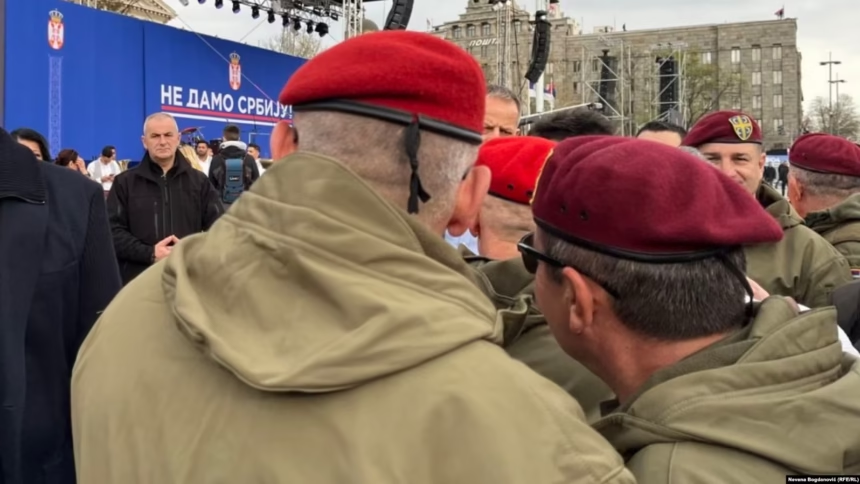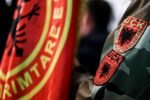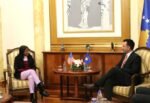Both pro-government and anti-government protest movements in Serbia have brought their own groups of war veterans into the streets, making them a visible symbol in the ongoing political crisis triggered by the tragedy in Novi Sad.
According to reporting by Radio Free Europe/Radio Liberty (RFE/RL), some of these individuals are directly connected to security structures of the 1990s, while others have ties to Russian nationalist and veterans’ organizations.
Veterans on the Anti-Government Side
Anti-government protests, including those led by students and Dijana Hrka, the mother of a victim who died when a structure collapsed in Novi Sad, are accompanied by individuals who present themselves as:
- Participants in the Kosovo War, especially the “Battle of Košare”
- Protectors of students and citizens
This group is informal and unregistered. The most visible figure among them is Nenad Stanić, who claims to have participated in both the Bosnian War (1992) and the Kosovo War (1999).
Stanić has publicly associated himself with:
- Russian volunteer Albert Andijev, who fought for Serbian forces in Kosovo
- Serbian far-right leader Damjan Knežević and the movement “Narodne patrole”
- Serbian volunteers who fought with Russian forces in Ukraine
Although rumors have circulated about Stanić’s links to Russian security services, RFE/RL could not verify these claims. Stanić insists he is not part of any organization and that such accusations aim to discredit him.
Another prominent figure was Siniša Jevtić, a self-proclaimed “Košare fighter” and former director of the foundation Brat za brata.
His organization was connected to the Serbian branch of “Bojevo bratstvo,” an organization tied to a major Russian veterans’ network in Moscow Oblast that includes individuals linked to the FSB (Russian Federal Security Service).
Jevtić was:
- Arrested in Kosovo in 2023 with weapons and equipment
- Accused of being in contact with Serbian protesters who clashed with KFOR
- Convicted and banned from entering Kosovo for three years
- Previously supportive of the far-right, pro-Russian Zavetnici party
He later broke ties with the Hrka/Stanić group after internal disputes.
Veterans on the Pro-Government Side
On the government side, veteran groups include former members of:
- JSO (“Red Berets”), Serbia’s notorious State Security paramilitary unit
- Individuals convicted or named in major political assassinations and war crimes
- Veterans from conflicts in Croatia, Bosnia, and Kosovo
Notable figures include:
- Miodrag Repija, former JSO member mentioned in the Hague Tribunal’s judgment against Jovica Stanišić
- Janko Kereš and Slavimir Mitrović Pop, also linked to JSO
- Nenad Jovanović, often seen accompanying convicted war criminal Vojislav Šešelj
- Janko Benak, a long-time SNS supporter who publicly praised Zvezdan Jovanović, the assassin of Serbia’s Prime Minister Zoran Đinđić
- Goran Radosavljević “Guri”, former Gendarmerie commander associated by U.S. authorities with the murder of the Bytyqi brothers
- Vladimir Lazarević, former Yugoslav Army general convicted in The Hague for crimes against Albanian civilians in Kosovo
These individuals have appeared in uniform at pro-government camps near the Serbian Parliament, often posing with state officials, including President Aleksandar Vučić.
Why Are Veterans So Present?
Historian Dragan Popović explains that veterans are being used as symbols in a struggle over:
- Who represents the nation
- Who has legitimacy to use the imagery of war
- Who controls the narrative of the 1990s conflicts
He warns that the continued elevation of veterans—especially those involved in crimes—helps preserve the political continuity of the Milošević era and fosters an atmosphere of fear and intimidation.
Who Legally Counts as a Veteran in Serbia?
Serbian law defines a war veteran as someone who served in military or security forces during:
- A declared war, or
- An armed operation conducted in peacetime to “defend sovereignty.”
But because Serbia denied participating in the wars of Bosnia and Croatia, many fighters were never officially recorded in military documents—making the veteran category politically flexible and easily exploited.







